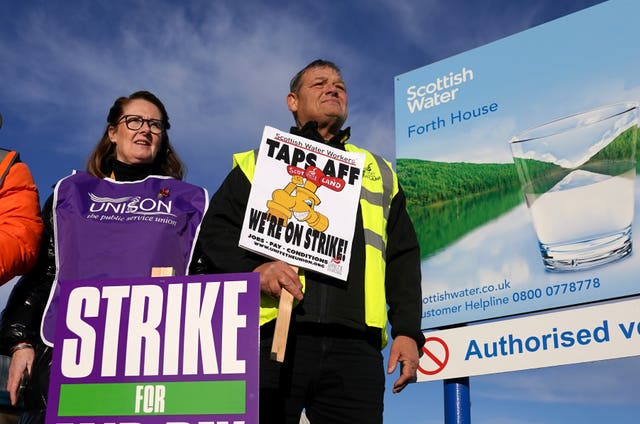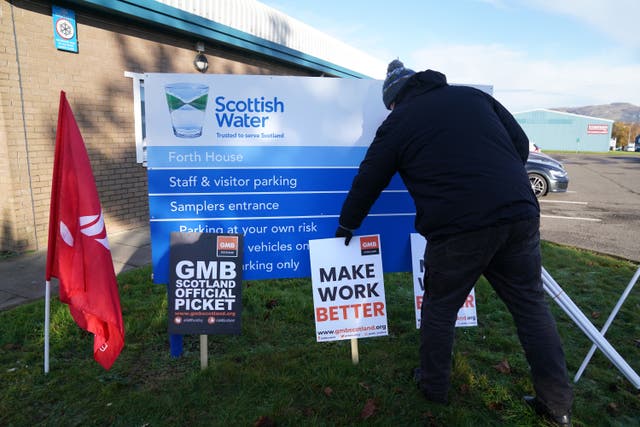
Scotland’s Government-owned water company has been accused of holding workers’ pay rises “to ransom” as industrial action begins.
Hundreds of staff will be on strike over the weekend in action that began on Friday, with walkouts planned over 48 days in the next three months.
The disagreement stems from a new grading structure unions claim could cost the lowest paid up to £5,000, with Patricia McArthur, the Scottish Water branch secretary for the trade union Unison, saying workers are missing out on a pay increase by not agreeing to the plans.
The company’s chief operating officer Peter Farrer said he “regrets” strike action has been taken, adding the firm remains “committed” to agreeing a deal, with its most recent offer including an 8% pay rise.
New talks are scheduled for Wednesday after the most recent negotiations – which went on into the early hours of Thursday – failed.
 Striking Scottish Water staff on the picket line outside the company’s Forth House in Stirling (Andrew Milligan/PA)
Striking Scottish Water staff on the picket line outside the company’s Forth House in Stirling (Andrew Milligan/PA)
Speaking to the PA news agency at the company’s waste water treatment plant in Shieldhall, Glasgow, Ms McArthur said: “We’re on strike because Scottish Water are basically holding our cost-of-living rise to ransom.
“They’re trying to force the staff to accept a new pay and grading system that’s not been collectively bargained by the unions and we have some serious concerns about the content of it.
“We are just looking to get a decent cost-of-living rise before Christmas, we’re looking to work with Scottish Water to try and come up with a pay and grading system that is going to be good for everyone.”
Ms McArthur went on to say the strike action is likely to cause issues in the water network as temperatures plunged to their lowest since April.
“We are teetering on the brink of a potential disaster for our network by going out on strike – we don’t want to do that,” she said.
“Scottish Water is the unseen utility – you don’t know it’s there, until it’s not.
“We’re really proud, we love our jobs, but it’s got to the point where we can’t afford not to strike.”
Mr Farrer sought to assure Scots that plans are in place to avert any issues with the water supply, saying: “We will do all we can to ensure customers do not experience any disruption to their water supplies and that treatment of the country’s waste water continues as usual, despite the industrial action.
“A reliable water source is vital for everyone. Maintaining public health and protecting the environment are our priorities and it is the responsible course of action for us to have contingency plans ready.
“We are committed to maintaining our high levels of customer service during this dispute and are confident that those staff members who do not strike will be ready, willing and able to help ensure we do so.
“We are dismayed the unions have taken this course of action over what, at 8% or more for all, is an exceptional proposal for our people and one of the best in the public sector.”
 Hundreds of workers walked out on the first of 48 days of strike action (Andrew Milligan/PA)
Hundreds of workers walked out on the first of 48 days of strike action (Andrew Milligan/PA)
Stephen Deans, a regional co-ordinating officer for the Unite union, said resolving the dispute could be “very simple”.
He added: “This is one of the most simple and straightforward disputes I’ve ever been involved in in my career.
“It’ll take for the management to agree to honour collective bargaining with the trade unions in relation to their pay and grading system, it’s as simple as that.”
Claire Greer, Scotland organiser at the GMB union, said the unions agree the current pay and grading structure – which the company says is 21 years old – is “not fit for purpose”, but any replacement should be devised in collaboration with staff.
“We absolutely want to work with Scottish Water to make sure that we get something that is better than what is there just now and something that works,” she said.
“What is on the table is not that, so we need to make sure that we work together and that the work that Scottish Water have already done in the background without the trade unions, if there is anything that we could use and we can progress from, then absolutely the unions are in complete agreement with that.”
The GMB, she said, has “many, many concerns” about the current proposals, including what it sees as a lack of a process for workers to appeal against the grades they are in and for job evaluations, as well as the claim that workers’ pay is being benchmarked against companies like McDonald’s and Amazon as opposed to other utility firms.


Comments & Moderation
Readers’ comments: You are personally liable for the content of any comments you upload to this website, so please act responsibly. We do not pre-moderate or monitor readers’ comments appearing on our websites, but we do post-moderate in response to complaints we receive or otherwise when a potential problem comes to our attention. You can make a complaint by using the ‘report this post’ link . We may then apply our discretion under the user terms to amend or delete comments.
Post moderation is undertaken full-time 9am-6pm on weekdays, and on a part-time basis outwith those hours.
Read the rules here